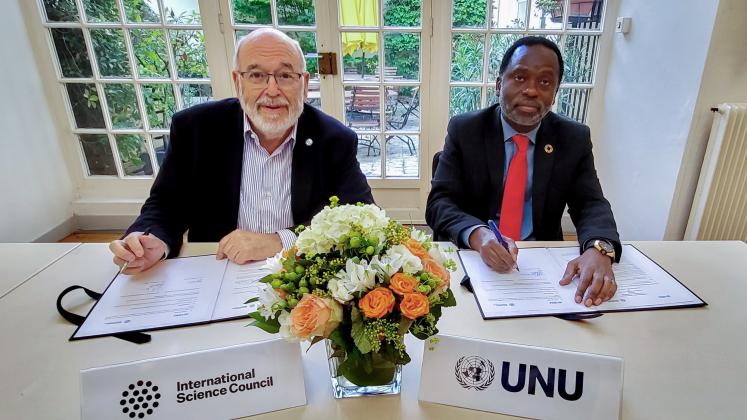Tokyo, Japan and Paris, France ― The United Nations University (UNU) and the International Science Council (ISC) have signed a memorandum of understanding to facilitate close cooperation on matters of common interest and effectively utilize existing expertise.
The agreement, signed in Paris on 15 September 2023 by UNU Rector Tshilidzi Marwala and ISC President Peter Gluckman, will contribute to increasing the impact and effectiveness of both organizations’ efforts in areas of common interest, such as contributing to achievement of the Sustainable Development Goals, preserving public trust in science, and supporting freedom, responsibility and ethics in science.
UNU and ISC will synergize their efforts through joint research projects, knowledge-exchange opportunities, and training programmes. Together, the two organizations will promote policy, research, and practice-relevant knowledge impacting the work of the United Nations and research communities in the fields of technology, innovation and sustainable development.
“This memorandum represents a significant step towards creating a more sustainable and scientifically advanced global community”, said UNU Rector Marwala. “Through this partnership, we commit ourselves to leveraging the resources of our two organizations for the betterment of society and the advancement of sustainable development.”
* * * * *
United Nations University (UNU)
UNU is a global think tank and postgraduate teaching organization with a mandate to contribute, through collaborative research and education, to efforts to resolve the pressing global problems of human survival, development and welfare that are the concern of the United Nations, its Peoples and Member States. UNU operates as a global system of 13 research and training institutes, coordinated by UNU Headquarters in Tokyo, Japan.
International Science Council (ISC)
ISC is a non-profit, non-governmental organization with a unique membership of over 200 scientific organizations, including international scientific unions and associations, and national and regional scientific organizations, such as academies and research councils. ISC, based in Paris, France, works at the global level to catalyze and convene scientific expertise, advice, and influence on issues of major concern to both science and society.



